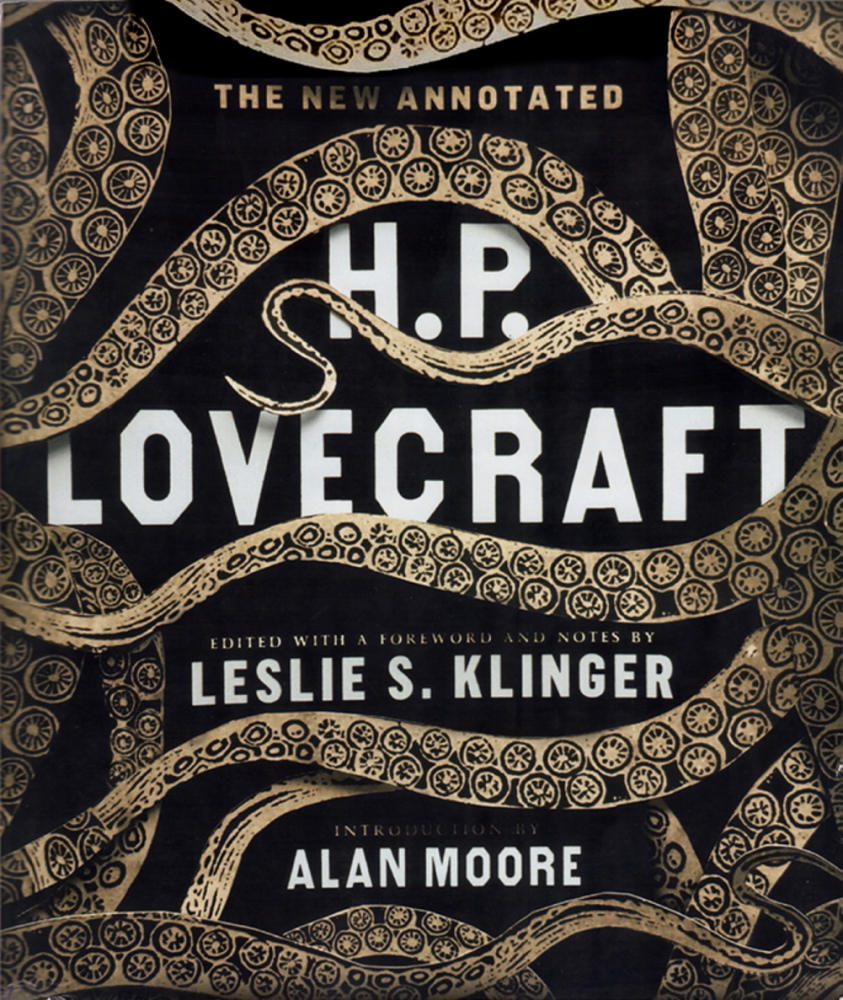What need is there of a new annotated edition of the stories and novellas of H.P. Lovecraft, faithful son of Providence, Rhode Island, master of the New England tale of cosmic terror? It’s never been easier to obtain the stories of the once-forgotten, now-acclaimed-but-sometimes-reviled horror writer, in whatever format suits you best. Most of his fiction can be found on the Internet, in the public domain and downloadable to your favorite digital device, or in any number of hardcover and paperback editions.
At nearly 900 pages, “The New Annotated H.P. Lovecraft,” edited by Leslie S. Klinger, certainly distinguishes itself through sheer heft. But despite its physical unwieldiness, this volume exhibits an intellectual nimbleness and scholastic thoroughness likely to intrigue readers new to the weird world of Lovecraft, as well as to delight old hands well familiar with Cthulhu, Nyarlathotep, Azathoth and the other Elder Gods who haunt his fiction.
Alan Moore, the wooly genius behind “Watchmen,” “V for Vendetta” and other comics masterpieces, provides an introduction that makes the case for why Lovecraft deserves continued readership, study and respect. Klinger, editor of “The New Annotated Sherlock Holmes” and “The New Annotated Dracula,” then delivers a foreword that clearly and succinctly outlines the history of supernatural fiction, the tragic trajectory of Lovecraft’s short life and the convoluted literary legacy he left in the wake of his death from intestinal cancer at age 47.
Presented chronologically, the annotated stories range from “Dagon,” written in 1917, to “The Haunter of the Dark,” published in 1936, four months before the author’s death. The volume spotlights the best of Lovecraft’s “Arkham cycle,” those tales centered in and around the fictional Massachusetts town. They include “Herbert West: Reanimator,” “The Call of Cthulhu,” “The Colour Out of Space,” “The Dunwich Horror” and “The Shadow Over Innsmouth.” Popular stories omitted include “The Outsider,” “The Rats in the Walls” and “Pickman’s Model.”
With nearly 300 color illustrations and 1,000 notes, “The New Annotated H.P. Lovecraft” offers an impressive level of fresh detail. First of all, many of the notes serve as a glossary, defining words and concepts no doubt obscure even in Lovecraft’s lifetime. Lovecraft’s prose can be so prolix that it’s helpful to have a quick explanation of terms in no way obvious from context. Then there are the notes that flesh out the cultural and political history of Lovecraft’s time. These are especially helpful in keeping track of the development of New England in general and Providence in particular, as both realistic and fantastic landscapes for Lovecraft’s imaginings.
Lovecraft has been in the news recently, with some recipients of the World Fantasy award objecting to having the trophy modeled on the visage of a writer they view as a bigot. Klinger doesn’t pussyfoot around the assertion that “Lovecraft’s racism and xenophobic views cannot be whitewashed.” He acknowledges the author’s hostility toward anyone not a white, middle-class New Englander and writes, “In the end, though one may despise his outmoded and pernicious social views, Lovecraft’s vision of the place of mankind in the cosmos…is more important than those views.”
Whatever happens to the World Fantasy trophy, it’s not likely that Lovecraft’s work will ever drift back into obscurity. Overwrought, repetitive and repugnant as some of his work is, there’s no denying the power of his imagery and the influence he has had on celebrated writers from Stephen King to Joyce Carol Oates to Neil Gaiman.
“The New Annotated H.P. Lovecraft” encourages readers to view the controversial author from a fresh perspective, a worthy aim for a worthy addition to any home library of science fiction, fantasy and horror.
Northern New England native Michael Berry is a writer and reviewer whose articles have appeared in various national and local publications. He has been the science fiction/fantasy columnist for the San Francisco Chronicle for many years. He can be reached at:
mikeberry@mindspring.com or @mlberry
Send questions/comments to the editors.



Success. Please wait for the page to reload. If the page does not reload within 5 seconds, please refresh the page.
Enter your email and password to access comments.
Hi, to comment on stories you must . This profile is in addition to your subscription and website login.
Already have a commenting profile? .
Invalid username/password.
Please check your email to confirm and complete your registration.
Only subscribers are eligible to post comments. Please subscribe or login first for digital access. Here’s why.
Use the form below to reset your password. When you've submitted your account email, we will send an email with a reset code.